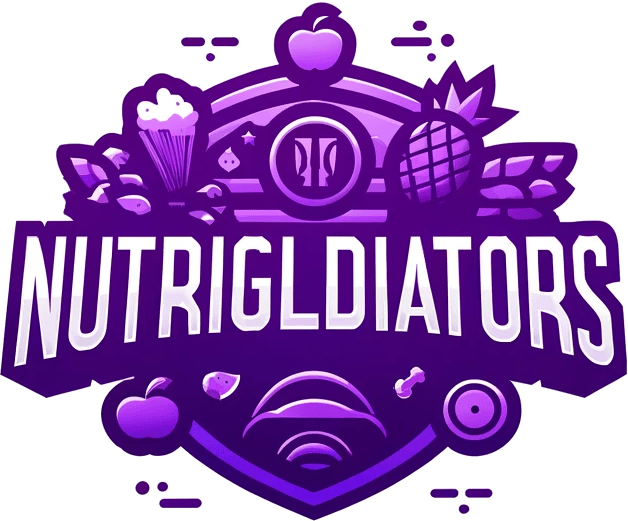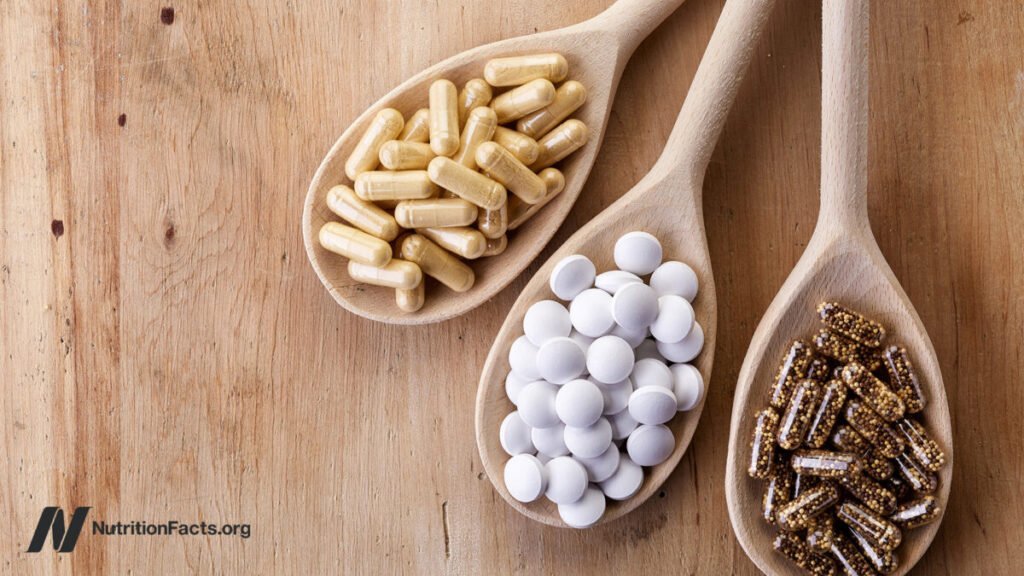[ad_1]
Are there any safe and effective dietary supplements for weight loss?
In a previous discussion, I noted that an investigation found that four out of five bottles of commercial herbal supplements bought at major U.S. retailers—GNC, Walgreens, Target, and Walmart—didn’t contain any of the herbs listed on their labels, instead “often containing little more than cheap fillers like powdered rice, asparagus and houseplants…”
You might hope your supplement just contains houseplants. Weight-loss supplements are infamous for being “adulterated with prescription and over-the-counter” drugs. In a sampling of 160 weight-loss supplements that “were claimed as 100% natural,” more than half were tainted with drugs and active pharmacological ingredients, ranging from antidepressants like Prozac to erectile dysfunction medications like Viagra. Diuretic drugs are frequent contaminants, which makes sense. In my previous videos on ketogenic diets, I talk about rapid water loss being “the $33-billion diet gimmick” that has sold low-carb diets for more than a century. But why the Viagra?
At least the spiked Viagra and Prozac are legal drugs. Researchers in Denver tested every weight-loss supplement they could find within a ten-mile radius. Alarmingly, they found that a third were adulterated with banned ingredients. The most common illegal adulterant of weight-loss supplements is sibutramine, which was sold as Meridia before it was yanked off the market back in 2010 for heart attack and stroke risk. Now, it is also blamed for cases of slimming supplement–induced psychosis.
An analysis of weight-loss supplements bought off the internet that were advertised with claims like “purely natural products,” “harmless,” or “traditional herbal” found that a third of them contained high doses of the banned drug sibutramine and the rest had caffeine. Wouldn’t you be able to tell if caffeine was added to a supplement? Perhaps not, if it also had temazepam, a controlled substance (benzodiazepine) “downer” sedative found in half of the caffeine-tainted supplements.
Doesn’t the FDA demand recalls of adulterated supplements? Yes, but they often just pop back up on store shelves. Twenty-seven supplements were purchased at least six months after recalls were released, and two-thirds still contained banned substances. That’s 17 out of 27 with the same pharmaceutical adulterant found originally, and 6 containing one or more additional banned ingredients. Aren’t the manufacturers penalized for noncompliance? Yes, but “the fines for violations are small compared to the profits.”
One of the ways supplement makers can skirt the law is by labeling them as “not intended for human consumption because it shifts the responsibility from the seller to the user”—for example, labeling the fatal fat-burner DNP as “an industrial- or research chemical.” This is how designer street drugs can be sold openly at gas stations and convenience stores as “bath salts.” Another way is to claim synthetic stimulants added to slimming supplements are actually natural food constituents, like listing the designer drug dimethylamylamine (DMAA) as “geranium oil extract.” The FDA banned it in 2012 after it was determined that DMAA “was not found in geraniums.” Who eats geraniums anyway? Despite being tentatively tied to cases of sudden death and associated with hemorrhagic stroke, DMAA has continued to be found in weight-loss supplements with innocuous names like Simply Skinny Pollen made by Bee Fit with Trish.
There is little doubt that certain banned supplements, like ephedra, could help people lose weight. “There’s only one problem, and it’s a big one: This supplement may kill you,” wrote a founding member of the American Board of Integrative Medicine.
Are there any safe and effective dietary supplements for weight loss? As I discuss in my video Friday Favorites: Are Weight-Loss Supplements Safe and Effective?, when popular slimming supplements were put to the test in a randomized placebo-controlled trial, not a single one could beat out placebo sugar pills. “A systematic review of systematic reviews” of diet pills came to a similar conclusion: None appears to generate appreciable impacts “on body weight without undue risks.” That was the conclusion reached in a similar review out of the Weight Management Center at Johns Hopkins, which ended with: “In closing, it is fitting to highlight that perhaps the most general and safest alternative/herbal approach to weight control is to substitute low-energy density [low-calorie] foods for high-energy density and processed foods, thereby reducing total energy intake.” In other words, eat more whole plant foods and fewer animal foods and junk. “By taking advantage of the low-energy density [low-calorie] and health-promoting effects of plant-based foods, one may be able to achieve weight loss, or at least assist weight maintenance without cutting” down on the volume of food consumed or compromising its nutrient value.
Learn more about the risks of supplements in my video Are Weight Loss Supplements Safe?.
I referred to a keto diet video I did, check out the related posts below the links to other videos and blogs in that series.
Learn more about optimal weight loss in my book, How Not to Diet.
Click here to get The Oxridized Cholesterol Strategy at discounted price while it’s still available…
[ad_2]



15 Comments
Time-saving service excellence, freed up our entire weekend. Time-saving champions found. Productivity boost.
Dry Cleaning in New York city by Sparkly Maid NYC
iwin – nền tảng game bài đổi thưởng uy tín, nơi bạn có thể thử vận may và tận hưởng nhiều tựa game hấp
Đến với J88, bạn sẽ được trải nghiệm dịch vụ cá cược chuyên nghiệp cùng hàng ngàn sự kiện khuyến mãi độc quyền.
Tham gia cộng đồng game thủ tại Go88 để trải nghiệm các trò chơi bài, poker phổ biến nhất hiện nay.
ji777activity is definitely the site I want to be on when playing games, so much to do on the site and to play, you can lose track of time! ji777activity
Just checked out pg13game. Seems like a decent place to chill and play some games. Nothing too crazy, just good ol’ PG-13 fun. Might hop on later!
MinesGameVN. Addicting little game. Be careful you don’t spend all day on it! Play if you dare minesgamevn.
Just downloaded the filbetapp It’s super convenient for placing bets on the go Plus the notifications keep me updated on the latest scores Pretty neat filbetapp
Gd86slot? Sounds like a potentially lucrative slot game. Hopefully they offer a good variety of games so I don’t get too bored grinding the same ones. Ready to give it a whirl! Find the slots at gd86slot
188bet88betbongda, the name’s a mouthful, but I see they focus on football betting. If you’re into betting on the beautiful game, maybe give 188bet88betbongda a looksee.
Apaldoapp is pretty slick! I’ve been using it and it’s got a decent selection. Definitely worth checking out if you’re looking for something new and fun. apaldoapp
Apaldologin makes getting into the game so easy! No more struggling with passwords. The login is smooth and quick. Definitely makes a big difference. apaldologin
Paldo77 is legit! Found some games I actually enjoy there. The experience is pretty good. Check it out and see if you like it! paldo77
https://askoff.ru